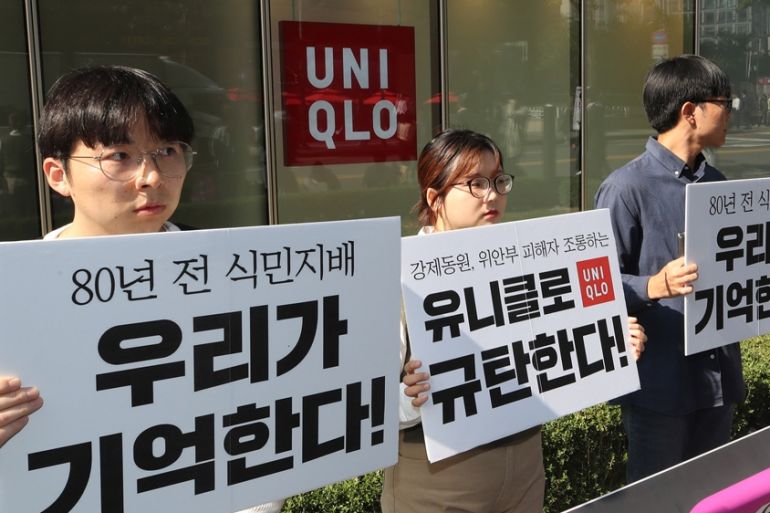Uniqlo ad pulled in South Korea over wartime sexual slavery row
Retail giant accused of making light of ‘comfort women’ debate with Korean translation of new advertisement.

Japanese fashion giant Uniqlo has withdrawn a new advertisement from South Korea following allegations that it defamed victims of Japan’s wartime sexual slavery campaign.
The advertisement, featuring 98-year-old United States fashion figure Iris Apfel, was pulled from screens in South Korea on Monday after it was accused of whitewashing colonial history.
Keep reading
list of 3 itemsSex slavery: South Korea marks first ‘comfort women’ day
Why South Korea is no longer on Japan’s approved export list
South Korea and Japan are both US allies, democracies and market economies faced with an overbearing China and a nuclear-armed North Korea, but their relationship is deeply strained by the legacy of Tokyo’s 20th-century expansionism.
In the advertisement, Apfel chats with Kheris Rogers, a designer 85 years her junior. The last line has Apfel, asked how she used to dress as a teenager, innocuously responding: “Oh my God, I can’t remember that far back.”
However, the translation submitted by Uniqlo’s Korean arm subtitled its version slightly differently, reading: “I can’t remember things that happened more than 80 years ago.”
Critics claimed that Uniqlo intentionally translated the older woman’s line as such in order to mock victims of sexual slavery as it could refer to the period of the second world war, when the Korean Peninsula was under Japan’s brutal colonial rule and an estimated 200,000 women – mostly from Korea – were pushed into sexual slavery in front-line brothels.
The phrase “Uniqlo comfort women” – in reference to the euphemism commonly used to describe the victims of sexual slavery – was among the most-searched terms on Naver, South Korea’s largest online platform, over the weekend, and demonstrators protested outside Uniqlo shops on Monday.
Uniqlo has denied any intention to cause upset.
“We did not have any political motive,” the company said in a statement. “However, we decided to halt the advertisement after taking into considerations that some people were disturbed by that part of the contents.”
The company added that the translation was intended to emphasise the age difference between the two models and to make it easier for South Korean customers to understand the meaning of the statement.
See how the iconic @IrisBApfel styles her UNIQLO Fleece. Find your new favorite in our wide selection of styles and colors. https://t.co/b7APoGpqNm #LifeWear pic.twitter.com/Y7FPqhLr6d
— UNIQLO (@UniqloUSA) October 15, 2019
Seoul and Tokyo are currently locked in a bitter trade and diplomatic dispute stemming from historical disputes and South Korean consumers have mounted boycotts of Japanese products.
Uniqlo – which has 186 shops in South Korea – has been one of the most high-profile targets, while Japanese carmakers’ sales dropped to nearly 60 percent year-on-year in September.
Analysts said the controversy had shone a new light on the politicisation of the neighbours’ complex history.
Kim Sung-han, a former foreign affairs minister who teaches at Korea University, told AFP news agency that the reaction was excessive and involved a “jump in logic” that assumed “everything Uniqlo does is political as a Japanese company”.
“I don’t see how her remark could be linked to the comfort women issue,” he added. “This is overly-sensitive.”
Japan colonised the Korean Peninsula from 1910 to 1945.
It has repeatedly said the issue of wartime sexual slavery was resolved by a 2015 deal struck with the previous South Korean administration, which provided an official apology and one billion yen ($9.03m) to establish a foundation to help surviving women.
The agreement was said to be a “final and irreversible” conclusion to the issue, however, some victims said they were not consulted on the terms of the agreement.